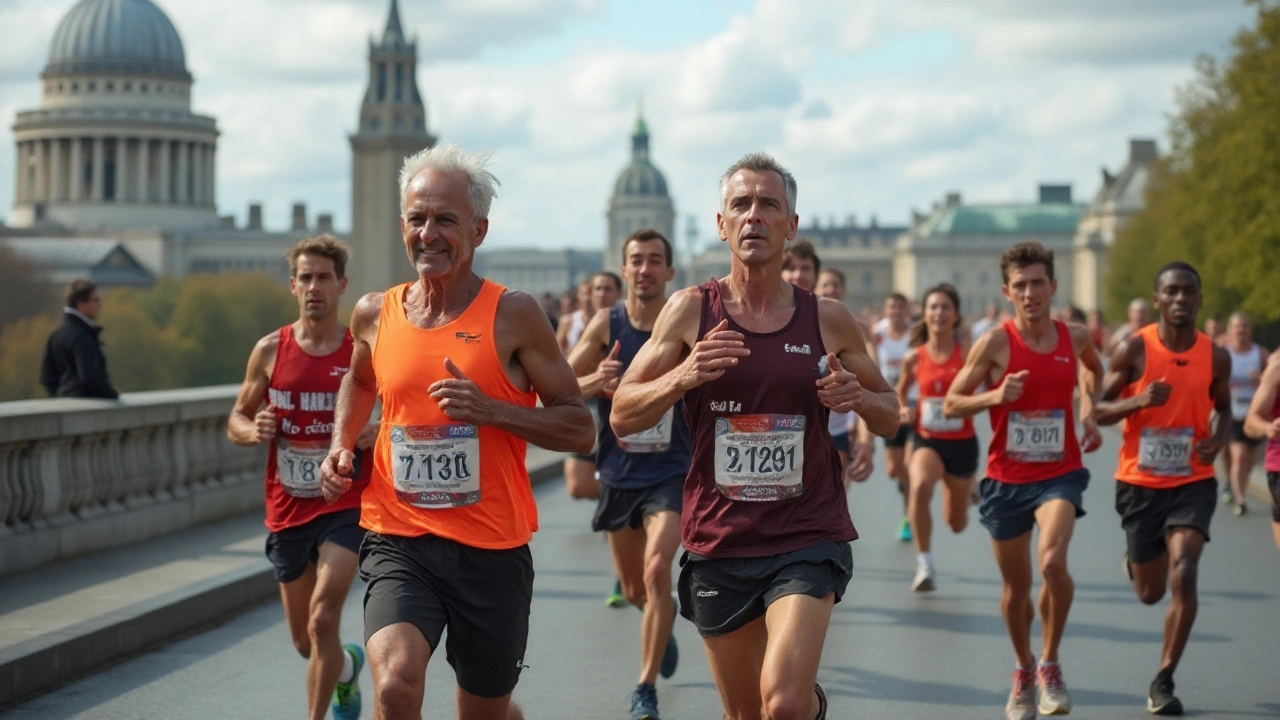Understanding Marathon Completion Times: What to Expect

Running a marathon is a considerable challenge, one that tests not only physical endurance but also mental tenacity. Many aspiring marathoners ask themselves, "How long does it take to finish a marathon?" The answer lies in a web of factors that influence racing speed and endurance. From professional athletes speeding through the course in just over two hours, to hobbyists taking twice that long or more, marathon finishing times display a remarkable range.
In this exploration of marathon completion times, we'll delve into the different influences that can affect your finish time, from age and fitness level to environmental conditions on race day. Additionally, we'll uncover tips for improving your time, while also encouraging you to embrace the joy of running at your own pace. Whether you're chasing personal bests or just want to enjoy the run, understanding these elements will help you approach the marathon with confidence and readiness.
- The Spectrum of Marathon Times
- Influencing Factors on Marathon Completion
- Average Times for Different Runner Levels
- Tips for Improving Your Marathon Time
- Historical Marathon Time Records
- Setting Personal Marathon Goals
The Spectrum of Marathon Times
The time it takes to run a marathon can differ tremendously from runner to runner. From the swift feet of elite marathoners like Eliud Kipchoge, who famously broke the two-hour barrier under controlled conditions, to the everyday enthusiasts who might take six hours or more to complete the course, the spectrum of marathon completion times is as varied as the runners themselves. This vast range highlights the beauty of marathon running—it is an event that does not exclusively belong to the fastest or the fittest, but to anyone with the grit and determination to cross the finishing line.
The average marathon time for beginners often sits between four and five hours. However, this can vary based on numerous factors such as the runner’s age, sex, fitness level, and race conditions. For seasoned runners, finishing in under four hours is a common goal. It's interesting to note how ambitious runners push their limits with each race, inspired perhaps by the legendary athletes who have carved their place in marathon history. For instance, the average finishing time for male marathoners is roughly around 4:30 while female marathoners tend to clock in just under five hours.
Environmental factors play a pivotal role too. A sunny, warm day can sap a runner’s energy much faster than cool, cloudy conditions, and thus significantly impact the finishing time. Moreover, the type and profile of the racecourse—whether it's hilly or flat—can make a substantial difference. The prestigious Boston Marathon, with its notable Heartbreak Hill, poses a unique challenge and can affect runners' times compared to more flat, urban courses like the Berlin Marathon.
In recognizing these variances, the Boston Marathon sets a challenging qualifying standard, while other races use it as a benchmark to define elite finishers. Realizing these marathon completion times offers insights into how varied and inclusive the marathon community is. Runners of all stripes—those chasing their personal bests or simply aiming to finish—find common ground in the spirit of perseverance.
"The body achieves what the mind believes." This popular motto amongst runners encapsulates why marathons inspire such dedication across the world. A marathon is more than just a test of strength and speed; it's a testament to the human spirit's ability to dream beyond limits.
For novice runners looking to set realistic goals, understanding this spectrum of times can be encouraging. It highlights that there's room for runners of all speeds and styles. With dedicated training and perseverance, many beginners find themselves pleasantly surprised by how their timings improve over the span of a few races. It's this promise of growth and improvement that often fuels a runner's journey, urging them to lace up and embrace the challenge time and time again.
Influencing Factors on Marathon Completion
Every marathon runner knows that race day presents a unique set of challenges influenced by manifold factors. One of the most significant influences is the runner's own physical condition, including overall health and fitness levels. Training is vital and not just about logging miles. Strengthening endurance, flexibility, and resilience through diverse workouts like interval training and cross-training can greatly affect marathon completion time. Tailored programs targeting core strength and muscle imbalance corrections are beneficial strategies for aspiring marathoners.
The mental aspect of running cannot be understated either. A runner's mindset can be the difference between pushing through the 'wall' around mile 20 and succumbing to fatigue. Incorporating mental resilience training, such as visualization and motivational techniques, into a routine can help to keep spirits high and focus sharp during crucial moments of the race. Environmental factors, too, play a critical role. The stark differences between running amidst the sweltering heat and humidity compared to a cool, airy morning can heavily tilt marathon completion times. Hence, many runners acclimate themselves to various weather conditions.
Additionally, gender and age demographics often display differing average marathon times. On average, men tend to have faster times than women, though this gap narrows with increased age. Contrary to common belief, older runners frequently surprise with competitive times due to experience and strategic preparation. Nutrition also finds its place in this complex landscape. Fueling up with the right balance of carbohydrates, protein, and fats in the weeks preceding, as well as strategizing hydration before and during the race, is crucial. A poorly balanced diet can lead to 'bonking,' a runner's term for sudden fatigue.
In marathons worldwide, elevation changes and course layouts have their impact. Runners participating in marathons like the one in Boston anticipate uphill battles, while others find solace in flatter routes like the Berlin Marathon.
"Your strengths are what lead you to your goals, not your competition," notes seasoned runner Kara Goucher, emphasizing strategic thinking over sheer rivalry.Here, the dynamics differ as terrains test different muscle groups and alter pacing strategies. Invariably, strategic planning assists in capitalizing on one’s own strengths while navigating challenges imposed by race settings.
Let us turn our focus to pacing strategies, crucial for a successful marathon. Runners employ varied strategies, from even pacing - maintaining the same pace throughout - to negative splits, where they aim to run the first half slower and the latter half faster, hoping that their conserved energy can secure them a personal best. Discovering which pacing strategy works best requires attentive training and often in marathon-like environments. Lastly, social dynamics shouldn't be overlooked: many runners perform better on race day when surrounded by peers, spurred on by enthusiastic crowds lining the course.
Whether in metropolitan settings or remote scenic races, understanding and leveraging these factors can spell the difference between a discouraging race and a triumphant finish. Most importantly, having a personalized plan built around these influences is paramount for any runner aspiring to conquer the marathon with a time they can hold dear in accomplishment.

Average Times for Different Runner Levels
Understanding the average marathon time can be a game-changer for both beginners and seasoned runners. It's no secret that elite athletes clock in astonishingly fast times – the world record is just above two hours! Yet, these marvels shouldn't overshadow the accomplishments of everyday marathon warriors. It's essential to recognize that marathon completion time isn't just about competition; it's about personal achievement and endurance. Let's break down the average times you might expect depending on your running experience.
Elite Runners
Elite runners, often seen flying past the rest, complete marathons in roughly 2 hours to 2 hours and 15 minutes. These athletes dedicate years of intense training, refining their speed and efficiency. Such performances are usually witnessed in global events and often lead to podium finishes. Their commitment to rigorous schedules, optimized nutrition, and strategic pacing is pivotal in achieving these times.
Experienced Amateurs
Experienced marathoners, who often have several races under their belt, complete the 26.2 miles in around 3 to 4 hours. These runners maintain a stringent training regimen that might include a mix of long-distance runs, tempo training, and strength exercises. They usually aim to improve their personal bests at each race, harnessing data from their training logs to make informed adjustments. For many, hitting the sub-4-hour mark is a notable achievement, reflecting months, if not years, of dedicated preparation.
Beginner Runners
For beginners, reaching the finish line, regardless of time, is a significant milestone. On average, first-timers may complete a marathon in 4.5 to 6 hours. Their journeys are often about overcoming personal challenges and embracing the marathon experience at their own pace. Consistent training, often over several months, aids in building the resilience needed to finish. The journey may encourage runners to find community in running groups, where shared experiences amplify motivation.
"The real marathon starts at 20 miles. Not because it's long, but because it's mental." – Meb Keflezighi, Olympic Silver Medalist
Popular Race Statistics
To illustrate these average times, here's a snapshot of data from well-known races:
| Marathon | Average Time (2023) |
|---|---|
| Boston Marathon | 4:02:30 |
| London Marathon | 4:14:35 |
| New York City Marathon | 4:34:45 |
Remember, these times may vary based on numerous factors such as weather conditions, course difficulty, and individual readiness. Tailoring your preparation is key to improving your marathon experience. By embracing your unique running journey, setting realistic goals, and staying motivated, you can enjoy the race and celebrate your marathon completion time as a testament to your hard work and perseverance.
Tips for Improving Your Marathon Time
Improving your marathon completion time is a goal shared by many runners. Whether you're a seasoned marathoner or a first-timer, there's always room for enhancement in speed and endurance. The key lies in the proper balance of training, nutrition, and mental toughness. Let's delve into some effective strategies that can help shave minutes off your marathon completion time. First, it's essential to establish a solid training plan that includes a mix of long runs, speed work, and easy recovery days. This approach not only builds physical strength but also helps prevent injuries. Experts recommend gradually increasing your weekly mileage, no more than 10 percent each week, to allow your body to adapt smoothly.
Interval training is another powerful technique for boosting speed. This involves alternating periods of high-intensity running with moments of rest or slower pace. Over time, these bursts of intensity improve aerobic capacity, allowing you to run faster over longer distances. Consider incorporating hill workouts too, as they strengthen leg muscles and improve cardiovascular health. In a
Sage Running coach David Roche once said, "Hills are speed work in disguise," highlighting their hidden benefits for marathon runners.To keep motivated and track progress, some runners find success by using running apps that log their runs and compare statistics locally and globally. With data analysis and feedback, runners can focus on areas needing more attention, tweaking their training plans accordingly.
Diet plays a crucial role in improving marathon performance. Eating the right balance of carbohydrates, protein, and fats offers energy sustenance throughout training cycles. Hydration is equally vital. Runners lose significant amounts of fluids, so it's important to replace them adequately to maintain performance levels. The night before a long run, indulge in a carb-rich meal to fuel your muscles. On the day of the workout, begin with a balanced breakfast, such as oatmeal with banana and nuts. During runs lasting more than an hour, consider consuming gels or sports drinks to replenish glycogen stores.
Mental preparation is often the most underrated aspect of marathon training. Crossing the finish line is as much a mental battle as it is physical. Visualizing the race, breaking it into manageable sections, and maintaining an optimistic mindset are crucial mental tactics. Building a pre-race routine and utilizing relaxation techniques such as deep breathing or meditation can also help to stay focused during the marathon. A study from the University of Essex discovered that positive self-talk improved endurance performance by 18%, demonstrating the power of the mind over physical performance.
Consistency is the secret sauce in marathon training. It’s about committing to your routine and not skipping runs, even when motivation wanes. Set realistic goals, and celebrate small victories to maintain enthusiasm. Joining a running community or finding a training partner can provide supportive camaraderie, making runs more enjoyable. Remember, every runner progresses at their own pace, and celebrating each milestone is key to keeping the spirit high as you work towards your marathon goals.

Historical Marathon Time Records
When we talk about marathon racing, one cannot ignore its rich history imbued with remarkable achievements and stories that stand as testament to human endurance and will. Over the decades, records have been broken, pushing the boundaries of what many believed humanly impossible. Consider this: in 1960, Abebe Bikila took the world by storm when he ran barefoot through the streets of Rome at the Summer Olympics, clocking a time of 2:15:16. This achievement not only set a new Olympic record but also ignited the spirit of marathon running in Africa.
Fast forward to recent times, and the name Eliud Kipchoge shines brightly on the marathon stage. Kipchoge's remarkable feat in 2019, where he completed a marathon distance in under two hours at a special event in Vienna, was hailed as one of the greatest athletic achievements, though not an official record due to the use of pace setters and other aids. His official record, however, stands at an astonishing 2:01:39, set during the Berlin Marathon in 2018. This performance epitomizes the term marathon runners and sets the gold standard for what the human body can achieve with the right training and determination.
Eliud Kipchoge once stated, "The marathon is like life... you build from zero to something." His words echo the journey most marathon runners undertake, from their first step in training to crossing the finish line.
The women's marathon has also seen its share of record-breaking performances. Paula Radcliffe's world record time of 2:15:25, set in London in 2003, stood as a pinnacle for 16 years. Her incredible pace and poise became a source of inspiration for countless athletes around the world. In recent years, Brigid Kosgei has emerged as a dominant figure, surpassing Radcliffe's record with a time of 2:14:04 in 2019 at the Chicago Marathon, showcasing the ever-evolving nature of women's marathon running.
These historical milestones are not just numbers on a record sheet; they represent the dedication and evolution within the sport. They highlight how advancements in training techniques, nutrition, and technology have contributed to shaping marathon performance. As aspiring marathon runners, understanding these records provides valuable insights into how personal limits can be challenged and embraced throughout their training journey.
Setting Personal Marathon Goals
Establishing personal marathon goals is an essential step in your journey towards the finish line. This process is deeply personal and involves much more than aiming for a specific average marathon time. It requires honest self-assessment, strategic planning, and a healthy balance of ambition and realism. To start, consider your current fitness level, past experiences with running, and any practice races you might have participated in. If you're aiming to improve upon previous marathon times, it might be helpful to analyze data from those runs, such as pacing, nutrition, and hydration strategies. By doing so, you can glean insights into areas that worked well and those that might need a tweak.
When setting your marathon goals, it is crucial to understand the concept of A, B, and C goal setting. An 'A' goal represents your dream goal, the one you'd love to hit if everything goes perfectly on race day. The 'B' goal should be challenging yet attainable with a slightly lesser performance than your perfect race. Finally, your 'C' goal is your fallback, ensuring that even if the conditions aren't ideal, you're still achieving a satisfying performance. This strategy helps mitigate the many variables that could affect your marathon performance, like weather and health issues, while still keeping you motivated and focused.
A notable saying comes to mind when discussing this, from veteran marathoner Hal Higdon, who once said,
"The marathon is not really about the marathon, it's all about the training."This quote captures the essence of marathon preparation, reminding us that success in setting and reaching goals heavily depends on how well you've disciplined yourself in the months leading up to the big day.
The importance of aligning your marathon training tips with personal goals cannot be overstated. It might involve mapping out specific training blocks, incorporating various running intensities, or pairing runs with complementary activities such as strength training or yoga. Use technology to your advantage: GPS watches and running apps can help track progress, offering metrics that reveal much about your current state and what's needed to advance. Don't forget to periodically reassess your goals as you progress, adjusting them as necessary to reflect improvements or setbacks.
Sometimes, it's not all about clocking a sub-four-hour marathon or securing a qualifying time for a prestigious race like the Boston Marathon. The experience itself can hold tremendous value and purpose. Perhaps your goal is to raise funds for a cause, bond with a training group, or cross destinations off your bucket list through participation in destination marathons. These non-time-based goals can provide motivation during tough runs and a sense of fulfillment that exceeds any finish-line clock.
Finally, remember to celebrate all victories along the way, no matter how small. Document your achievements, keep a training log, and reflect on milestones reached, like longest distance run or fastest mile paced. These increments of progress can be powerful motivators, ensuring that your marathon journey remains as rewarding and enlightening as reaching the finish line itself.
